In 1999, Texas passed a landmark clean energy law, beginning a groundswell of new policies that promised to make the US a world leader in renewable energy. As Leah Stokes shows in Short Circuiting Policy, however, that policy did not lead to momentum in Texas, which failed to implement its solar laws or clean up its electricity system. Examining clean energy laws in Texas, Kansas, Arizona, and Ohio over a thirty-year time frame, Stokes argues that organized combat between advocate and opponent interest groups is central to explaining why states are not on track to address the climate crisis. She tells the political history of our energy institutions, explaining how fossil fuel companies and electric utilities have promoted climate denial and delay. Stokes further explains the limits of policy feedback theory, showing the ways that interest groups drive retrenchment through lobbying, public opinion, political parties and the courts. More than a history of renewable energy policy in modern America, Short Circuiting Policy offers a bold new argument about how the policy process works, and why seeming victories can turn into losses when the opposition has enough resources to roll back laws.

The Arctic
Klaus Dodds, Mark Nuttall
audiobook
Poor Economics : A Radical Rethinking of the Way to Fight Global Poverty
Abhijit V. Banerjee, Esther Duflo
audiobook
The Little Book of Bulletproof Investing : Do's and Don'ts to Protect Your Financial Life
Phil DeMuth, Ben Stein
audiobook
The Alpha Masters : Unlocking the Genius of the World's Top Hedge Funds
Maneet Ahuja
audiobook
The Vory
Mark Galeotti
audiobook
Manufacturing Consent
Edward S. Herman, Noam Chomsky
audiobook
SPIN Selling
Neil Rackham
audiobook
The Ascent of Money
Niall Ferguson
audiobook
Connectography
Parag Khanna
audiobook
This Machine Kills Secrets
Andy Greenberg
audiobook
Uranium
Tom Zoellner
audiobook
Swing Trading For Dummies
Omar Bassal
audiobook
